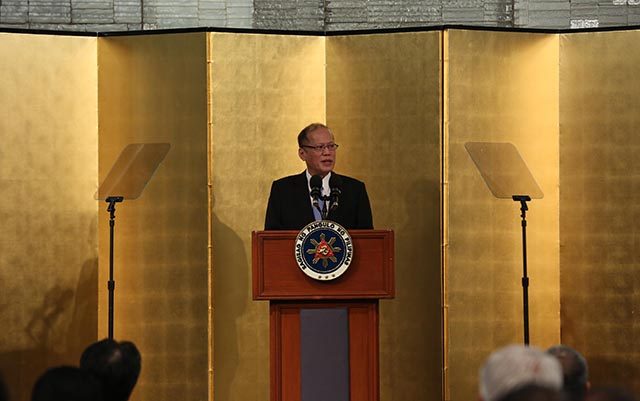SUMMARY
This is AI generated summarization, which may have errors. For context, always refer to the full article.

MANILA, Philippines – President Benigno Aquino III on Thursday, June 4, invited Japanese businessmen to partner with local companies and to bid for some of the country’s public-private partnership (PPP) projects.
Citing an improved business climate, Aquino said there is “no better time” for Japanese investors to invest in Philippine infrastructure.
Aquino said at the Philippine Investment Forum, held at the New Otani Hotel in Japan, that many opportunities in the field of infrastructure await Japanese investors in the Philippines. There are 28 PPP projects currently in the pipeline for development.
Some of the PPP deals that are being rolled out by the government include Integrated Transport System-South Terminal Project; Operation & Maintenance of LRT Line- 2; Laguna Lakeshore Expressway Dike Project; New Centennial Water Source-Kaliwa Dam Project; as well as the operations, maintenance and development of five regional airports: Laguindingan, Davao, Iloilo, Puerto Princesa and Bohol.
This is on top of the 9 PPP projects that have already been awarded by the government. The latest deal, the Cavite-Laguna Expressway deal, is expected to be bagged by the highest bidder “very soon.”
“The Philippines as an investment destination is more attractive today than at any other point in our history. We can further deepen, or forge partnerships in which all parties benefit. Our government’s track record speaks for itself, as well as our sustained commitment to moving this forward,” Aquino said.
President Aquino further said that aside from the PPP, his administration plans to increase the infrastructure budget, by making it at least 5% of the country’s gross domestic product (GDP) by next year. This is up from the 1.8% when he took power in 2010.
“We have also focused on enhancing critical transport infrastructure like ports and airports. We have completed the construction of a major airport in Laguindingan, Misamis Oriental, and are undertaking the construction of two more,” Aquino said.
This is on top of 43 other infrastructure projects across the country that are undergoing significant rehabilitation and improvement, he said, adding that 7 of 18 tourism ports have been developed.
‘Hard at work’ for energy sector
For the energy sector, Aquino said his administration “is hard at work” to ensure “consistent, diversified, and reasonably priced” power supply across the country.
Besides the 30 new power projects that have already gone online under his watch, Aquino said 48 more projects are on the pipeline between this year and 2020. These projects are seen to augment the country’s total dependable capacity to about 15,665 megawatts.
“The improvement of sectors like power and infrastructure has indeed redounded to the Philippines’ increased competitiveness. At the same time, we continue to believe that the most important sector—the most important resource—we can invest in is the Filipino people,” the Philippine president said.
Local manpower for specialized sectors
For the local information technology and business process management sector, which yields at least $18 billion in revenues, Aquino expressed hope that investors would also tap into the other skills of Filipino manpower.
Aquino said Filipinos can quickly demonstrate their ability to excel in more specialized areas, such as in legal transcription, accounting, engineering services, and animation.
“Game development is another area we are looking to develop—and I am certain that Japanese creativity, innovation, and technological prowess can help us to maximize this sector,” Aquino said.
Grow MSMEs sector
Aquino also vowed to grow the local micro, small and medium enterprises (MSMEs).
“Our Department of Trade and Industry has also been conducting seminars on Doing Business in Free Trade Areas, which will help MSMEs maximize the opportunities that come with greater economic integration,” he said.
The President cited the country’s first Fabrication Laboratory Shared Services Facility, also known as FabLab SSF, which was funded by the Japan International Cooperation Agency.
Aquino told Japanese investors present at the event that the facility will “directly benefit 135 MSMEs in Bohol by providing them access to technology,” such as laser cutters and 3D printers. – Rappler.com
Add a comment
How does this make you feel?
There are no comments yet. Add your comment to start the conversation.